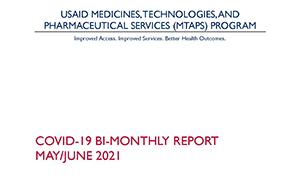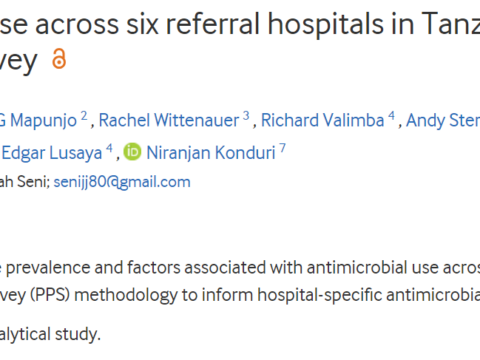MTaPS Support
The USAID MTaPS Program supports Tanzania in strengthening the capacity to control resistance to antibiotics under the Global Health Security Agenda by bolstering infection prevention and control and antimicrobial stewardship. To strengthen the country’s COVID-19 response and emergency preparedness, MTaPS is providing COVID-19 vaccine vigilance support under the US Initiative for Global Vaccine Access. With PEPFAR’s support, the program supports regulatory system strengthening and pharmacovigilance for the public and private sectors.
Program Objectives
MTaPS Tanzania supports activities to improve the quality of care and contain antimicrobial resistance (AMR) by:
- Building the capacity of in-country stakeholders to optimize the use of antimicrobials, in collaboration with the Pharmaceutical Services Unit (PSU) of the Ministry of Health (MOH) through the AMR multisectoral coordinating committee and AMS technical working group
- Strengthening IPC practices by working alongside PSU through the AMR multisectoral coordinating committee, AMS and IPC technical working groups, MOH’s Health Quality Assurance Unit, the University of Dar es Salaam, and other partners
- Supporting multisectoral coordination in collaboration with PSU, the AMR multisectoral coordinating committee, and the committee’s IPC, AMS, awareness, research, and surveillance technical working groups
In a PEPFAR-supported initiative, MTaPS is collaborating with the Tanzania Medicines and Medical Devices Authority (TMDA) to strengthen systems and capacity for providing patient-centered care and pharmaceutical services.
Enhancing multisectoral collaboration for AMR
- Evaluating the multisectoral National Action Plan on Antimicrobial Resistance 2017-2022 and supporting development of the new NAP-AMR 2023-2028
- Fostering multidisciplinary stakeholder feedback that led to the development of a multisectoral AMR communications strategy using a One Health approach―the former chief medical officer of Tanzania lauded this as a model government publication
Optimizing the use of antimicrobials
- Facilitating three government entities to conduct Tanzania’s first national consumption of antimicrobials using the standardized WHO methodology, the first to be published in sub-Saharan Africa
- Assessing AMS policies and activities, including regulatory framework and supply chain management of antimicrobials, and supporting health facilities to implement AMS stewardship programs through training and mentorship of health facility staff
- Supporting the MOH to facilitate multidisciplinary stakeholder inputs for the revision of the Standard Treatment Guidelines and National Essential Medicines List (STG/NEMLIT) for Tanzania Mainland (6th Edition) 2021
- Providing technical support and lessons from other countries to integrate the access, watch, and reserve (AWaRe) categorization of antibiotics into the STG/NEMLIT that took into account data from Tanzania
- Disseminating AMS policies and guidelines in 10 hospitals and strengthening the capacity of health care workers on professional ethics and proper use of antimicrobials
- Supporting the preparation of a template for developing a hospital-selected list of antimicrobials, with details on their use
Strengthening IPC practices
- Supporting the review and dissemination of the MOH-approved 2018 national IPC guidelines and training health care workers on the guidelines
- Facilitating the update of health college IPC courses to reflect the current IPC guidelines
- Strengthening the Center for Distance Education’s capacity to host and manage an e-learning platform for in-service capacity building for IPC
- Strengthening the IPC technical working group for supportive supervision, including using tools, and monitoring, providing feedback, and reporting to increase compliance with the current IPC guidelines and standards
- Developing a national IPC monitoring and evaluation system and facilitating integration of IPC indicators into the national health information management system, DHIS2
- Developing the national health care-associated infection surveillance system
Strengthening systems and capacity for patient-centered care and pharmaceutical services
- Developing guidelines for monitoring the safety of medicines used in pediatric populations (1st edition, November 2021)
- Disseminating national COVID-19 guidelines and standard operating procedures in health facilities
- Facilitating the revision of terms of reference for the safety advisory committee to incorporate pediatric experts
- Strengthening the capacity of TMDA to evaluate the quality, safety, and efficacy of medicines to improve efficiency of executing regulatory functions
- Mapping the process of registration and importation of antiretroviral medicines (ARVs) for the public sector to uncover bottlenecks in the supply chain and make recommendations to improve the market authorization and import processes
- Training TMDA medicine evaluators and conducting medicine dossier evaluations to evaluate the quality, safety, and efficacy of medicines, such as ARVs
- Training TMDA staff, interns, and external assessors and assessing periodic safety update reports and risk management plans






